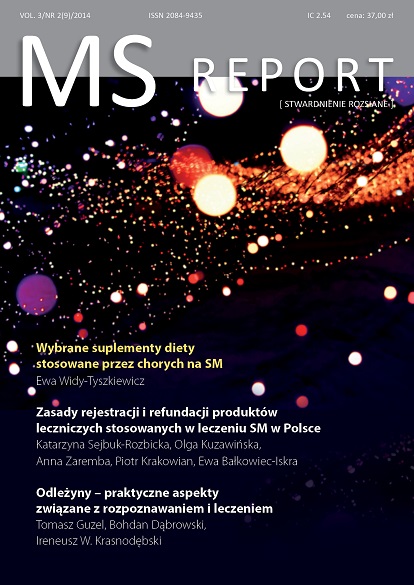Some dietary supplements used by patients with multiple sclerosis Review article
Main Article Content
Abstract
Medicinal products and dietary supplements containing Echinacea preparations are currently used to stimulate the immune system, not only in the upper respiratory tract infections, but also by people with impaired immune function. There is some evidence that products containing the aerial parts of Echinacea purpurea might be effective in the early treatment of colds in adults but results are not fully consistent. Randomized clinical trials did not confirm the effectiveness of long-term administration of Echinacea preparations to prevent bad colds. Absolute contraindication for treatment are autoimmune diseases, where the substrate is autoimmunity to its own immune system, connective tissue diseases (collagenases) and multiple sclerosis (MS).
An attempt to provide the optimal balance between omega-6 and omega-3 fatty acids, which could maintain the proper function of the immune system is the administration of the evening primrose seeds oil (Oenothera biennis) in patients with MS. Meta-analysis of the Cochrane group assessing 6 controlled randomized clinical trials in patients with MS showed little benefit after administration of omega-6 fatty acids. It was found that administration of omega-6 fatty acids does not have a significant impact on the progression of the disease, but may have a tendency to reduce the frequency of relapses within 2 years. Although the therapeutic efficacy of the evening primrose oil in patients with MS is uncertain, and the possible interactions and side effects can significantly limit its use, one would encourage to just such supplementation.
Article Details
Copyright © by Medical Education. All rights reserved.
References
2. Van Baarlen P., Wells J.M., Kleerebezem M.: Regulation of intestinal homeostasis and immunity with probiotic lactobacilli. Trends Immunol. 2013; 34(5): 208-215.
3. Yadav V., Shinto L., Bourdette D.: Complementary and alternative medicine for the treatment of multiple sclerosis. Expert Rev. Clin. Immunol. 2010; 6(3): 381-395.
4. Maker-Clark G., Patel S.: Integrative therapies for multiple sclerosis. Dis. Mon. 2013; 59(8): 290-301.
5. Schulten B., Bulitta M., Ballering-Brühl B. et al.: Efficacy of Echinacea purpurea in patients with a common cold. A placebo-controlled, randomised, double-blind clinical trial. Arzneimittelforschung 2001; 51(7): 563-568.
6. Schoop R., Klein P., Suter A. et al.: Echinacea in the prevention of induced rhinovirus colds: A meta-analysis. Clinical Therapeutics 2006a: 28(2): 174-183.
7. Schoop R., Büechi S., Suter A.: Open, multicenter study to evaluate the tolerability and efficacy of Echinaforce Forte tablets in athletes. Adv. Ther. 2006b; 23(5): 823-833.
8. Stimpel M., Proksch A., Wagner H. et al.: Macrophage activation and induction of macrophage cytotoxicity by purified polysaccharide fractions from the plant Echinacea purpurea. Infect. Immun. 1984; 46(3): 845-849.
9. Gertsch J., Schoop R., Kuenzle U. et al.: Echinacea alkylamides modulate TNF-alpha gene expression via cannabinoid receptor CB2 and multiple signal transduction pathways. FEBS Lett. 2004; 577(3): 563-569.
10. Raduner S., Majewska A., Chen J.Z. et al.: Alkylamides from Echinacea are a new class of cannabinomimetics. Cannabinoid type 2 receptor-dependent and -independent immunomodulatory effects. J. Biol. Chem. 2006; 281(20): 14192-14206.
11. Woelkart K., Marth E., Suter A. et al.: Bioavailability and pharmacokinetics of Echinacea purpurea preparations and their interaction with the immune system. Int. J. Clin. Pharmacol. Ther. 2006; 44(9): 401-408.
12. Benson J.M., Pokorny A.J., Rhule A. et al.: Echinacea purpurea extracts modulate murine dendritic cell fate and function. Food. Chem. Toxicol. 2010; 48(5): 1170-1177.
13. Community herbal monograph on E. purpurea (L.) Moench, herba recens [online].
14. Community herbal monograph on Echinacea pallida (Nutt.), radix [online].
15. Community herbal monograph on Echinacea purpurea (L.) Moench, radix [online].
16. Community herbal monograph on Echinacea angustifolia (DC.), radix [online].
17. Barrett B.: Medicinal properties of Echinacea: a critical review. Phytomedicine. 2003; 10(1): 66-86.
18. Karsch-Völk M., Barrett B., Kiefer D. et al.: Cochrane Acute Respiratory Infections Group. Echinacea for preventing and treating the common cold. The Cochrane Library 2014, 2. DOI: 10.1002/14651858.CD000530.pub3.
19. Meyler’s Side Effects of Herbal Medicines. Echinacea species. Aronson J.K. (red.). Elsevier 2009: 66-68.
20. Beluzzi A.: N-3 and n-6 fatty acids for the treatment of autoimmune diseases. Eur. J. Lipid. Sci. Technol. 2001; 103(6): 399-407.
21. Simopoulos A.P.: Evolutionary aspects of diet: the omega-6/omega-3 ratio and the brain. Mol. Neurobiol. 2011; 44(2): 203-215.
22. Eaton S.B., Konner M.: Paleolithic nutrition. A consideration of its nature and current implications. New Engl. J. Med. 1985; 312(5): 283-289.
23. Johne A., Roots I:. Clinical Drug Interactions with Medicinal Herbs. Evid.-Base Int. Med. 2004; 2(4): 207-228.
24. Calder P.C., Yaqoob P., Thies F. et al.: Fatty acids and lymphocyte functions. Br. J. Nutr. 2002; 87(Suppl. 1): S31-S48.
25. Belch J.J., Hill A.: Evening primrose oil and borage oil in rheumatologic conditions. Am. J. Clin. Nutr. 2000; 71(Suppl. 1): 352S-356S.
26. Meyler’s Side Effects of Herbal Medicines. Oenothera biennis Aronson J.K. (red.). Elsevier 2009: 173.
27. Dworkin R.H., Bates D., Millar J.H. et al.: Linoleic acid and multiple sclerosis: a reanalysis of three double-blind trials. Neurology 1984; 34(11): 1441-1445.
28. Farinotti M., Vacchi L., Simi S. et al.: Dietary interventions for multiple sclerosis. Cochrane Database Syst. Rev. 2012 Dec 12; 12: CD004192. doi: 10.1002/14651858.CD004192.pub3.

